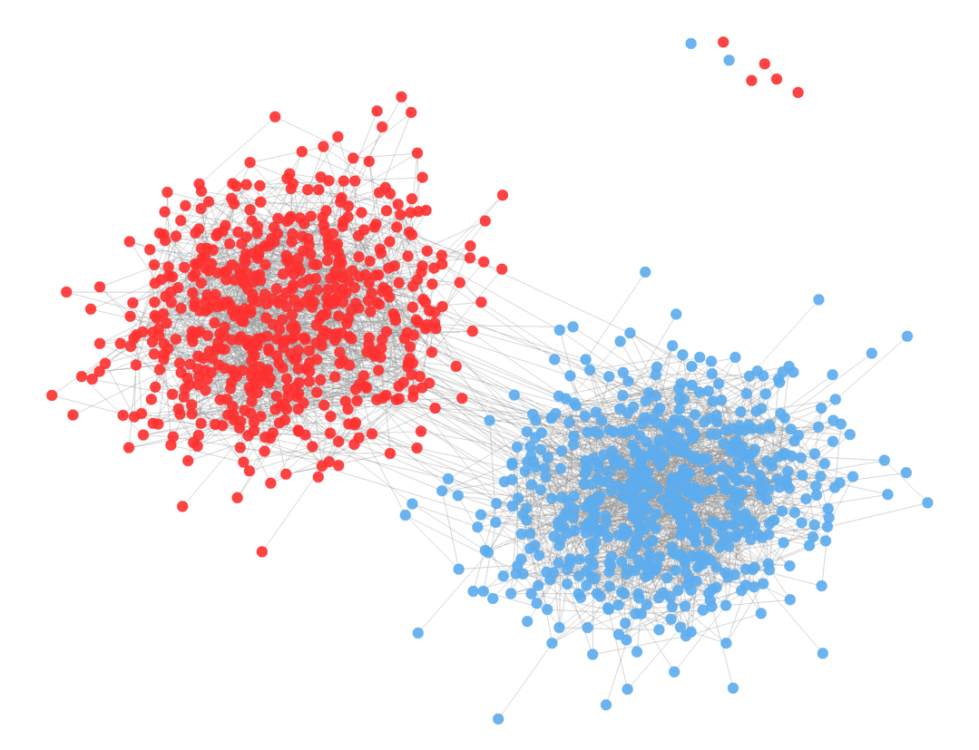Affective polarization is a term that describes how individuals tend to see their opposing political parties in a negative light and their co-partisans in a positive light. This bias can unknowingly cause ignorance and lead to less effective cooperation and understanding between groups and people of different parties. This psychological mindset is dangerous as it can cause blurred judgment and implicit bias. Especially in a two-party system such as that of the United States, affective polarization is heightened, leading to continual gridlock and tensions in the Capitol and beyond. With Democrats and Republicans pitted against each other in every situation, even in our own minds, one cannot help but wonder: Will we ever meet in the middle?
So what causes affective polarization? This bias has been exacerbated by social media, where echo chambers help to reinforce and amplify often extreme beliefs and shelter users from outside interference. People are able to stray away from discomfort and pick and choose what ideas, information, people, and content they interact with on the Internet. As expected, individuals often interact with content that they already agree with, and the personalized nature of digitized media — such as targeted ads, carefully curated content, and personalized news and information — all push social media users into a bubble. Regarding politics, this digitally-created bubble creates a continual confirmation of beliefs paired with the insulating outlet of communication that expels criticism, leading to the polarization of political views.
Regarding politics, this digitally-created bubble creates a continual confirmation of beliefs paired with the insulating outlet of communication that expels criticism, leading to the polarization of political views.
A new explanation for this political mindset has gained traction in recent years. This theory argues that current polarization can be better understood by considering social groups rather than policy disagreements. In this perspective, the focus lies on the interactions of parties as they vie for power on the political landscape. Aligning with a social group, whether that be Democrat or Republican, inspires identity-centered loyalty and can lead to viewing outside groups more negatively. So, how could the emergence of accessible media impact allegiance to a party?
To answer this question, it is necessary to look at a variety of factors. In a recent study, researchers from St. John’s University found a novel link between these two varying ideas about social identity and media. The study suggests that the cause of affective polarization does not lie in the radicalization of beliefs on the internet, but rather that new media strengthens the importance of identity in politics. New media technology emphasizes the homogenous group rather than individual thought, and in this way, turns the aspects of political debate into statements of identity. Values, opinions, and comments become markers of identity, making political debates less about rationality and critical thought and more focused on defense and the changing power dynamics between groups. The shift to an identity-based politics system decreases the chances of resolution and understanding because conflicts are no longer about opinions, but rather identity.
New media technology emphasizes the homogenous group rather than individual thought, and in this way, turns the aspects of political debate into statements of identity.
The COVID-19 pandemic is a stark example of how this mindset can be dangerous and contribute to public health crises. During the pandemic, the rift between Democrats and Republicans amplified, and partisan reasoning was the driving factor of individuals’ actions that affected the state of the pandemic. In a study done by researchers from Northwestern University, the University of Arizona, and the University of Pennsylvania, changing views by Republican leaders to align with Democratic perspectives led to a shrinking of the partisan gap on the topic of the use of a mask. These changes suggest that affective polarization influences individuals and makes them more willing to follow party cues, once again supporting the identity-based nature of this mindset.
Though it seems as if the political divide is only growing, there is hope for decreasing the prevalence of affective polarization. It is crucial that the partisan gap shrinks and politics shift towards more rational and idea-based debates, necessitating a shift away from identity-based politics. The benefits have the potential to ease gridlock, facilitate productive conversations, and allow for civil discourse. To move away from this system, inter-party dialogue, discourse about commonalities, support from leaders in fostering meaningful party contact, and correction of misperceptions about parties all must be undertaken.
PLOS One (2021). DOI: 10.1371/journal.pone.0258259
Nature Human Behaviour (2020). DOI:10.1038/s41562-020-01012-5


